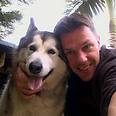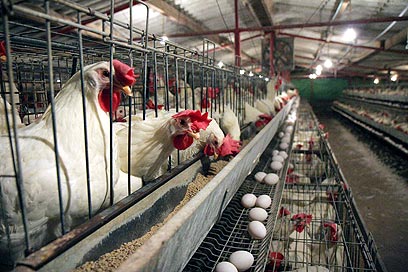
Gary Yourofsky has arrived in Israel. Some of us have watched the "best speech you will ever hear" on the Internet. He is a captivating, charismatic and provocative speaker who promotes animal rights and veganism. Some viewers change their ways, while others are disgusted and continue with their lives. But the following story is intended for those who claim that his lectures create antagonism and are "shooting vegetarianism in the feet."
I ate meat, sometimes twice a day, for most of my life. About a decade ago, after watching the animation film 'Chicken Run' about a band of chickens trying to escape their certain death, I stopped to think for a minute, and then continued eating. Eight years ago I adopted my first dog, Chappy. She died two years ago of diabetes, and I miss her very much, but she will always be a part of me. She opened my heart and strengthened my love and compassion for animals.
On April 16, 2005, six months after Chappy entered my heart, I was invited to a family birthday party, but I didn’t feel well and missed the festivities. When my family returned from the event they brought me a small aluminum tray with the word "calf" scribbled on its cover. I refused to eat the meat and explained that I do not eat babies. They asked: "What's the difference between calves and cows?" I replied, "There is a difference," but I had no idea what it was. It suddenly occurred to me that in order to continue enjoying the taste of meat I was unconsciously ignoring the fact that there really is no difference.

'Reduce harm to animals' (Archive photo: Edo Erez)
I called my sister, a vegetarian. She suggested that I reduce my meat intake to once a week, at Shabbat dinner. I agreed. The following Friday evening, my mother served baked chicken breast and meat pie, two of my favorite dishes. I didn’t touch the food, and I haven’t eaten meat since. Vegetarianism became easier as I found alternatives to meat, though every once in a while I do eat meat – in my dreams. But these dreams are riddled with guilt and a sense of failure – nightmares.
I became a vegan exactly three years later. I needed a special date, "three years since I became a vegetarian," to give up eggs (nature's cheap glue), ice cream, pizza, cake and honey. Veganism is also more expensive than vegetarianism, and you feel it with every cup of coffee you order (three additional shekels for the soy milk), but ideology costs money. The only real difficulty is that sometimes I have to refuse a dish because I am not certain that it is "kosher." But apart from that, the transition to veganism has been a rather smooth one.
'You're no saint either'
Many people ask me "so what do you eat?" I eat many wonderful things: Hummus, tahini, falafel (Israel's national food is vegan!), french fries, pasta, corn, peas, bread, vegetables, fruit, nuts and more. Today there is an abundance of alternatives to meat, but you'd be surprised to learn that the most difficult aspect of veganism is not the food, but the loneliness.
Try to imagine what it feels like to be a part of a very small minority that shares common values. When I tell people I'm vegan they look at me as though I'd just landed from Mars, roll their eyes as though I had done something wrong and look at me as if I'm judging them – as if the ideological choice is about them and not the animals. Being vegan means that sometimes you feel lonely even among close friends and family. There is a huge ideological gap between you and almost the entire world around you. The worst is when an argument about morals begins.
As a lawyer and lecturer I'm used to arguments, but this is not just an argument, it is a repressed war. And when it rears its head, even for a moment, it is very painful and reminds me of how separated I am, ideologically, from most everyone else. I sit next to those closest to me while they are eating meat and I do what I used to do back when I also ate meat: Repress my emotions. Imagine that you are the only one at the table who believes in this very important value, and that value is being eaten at that same table. All I can do is look at my loved ones and remember that they too have morals. A person can eat meat and contribute to the world in a thousands different ways: Charity, generosity, love (for animals as well), integrity, compassion. There are so many good people in the world.
And then I look at myself and think: 'You're no saint either.' Vegans hurt animals in so many ways, unintentionally. And what is it that I am really doing for the animals? Close to nothing; a monthly donation to anima welfare organizations and veganism. When I walk past a chicken coop, a cowshed or a stray dog I remember how meager my contribution to animal welfare really is. Veganism merely reduces the harm I am causing to the animal world.
I believe the day will come when we will no longer take advantage of animals. That day is still far off, but we are moving in the right direction, and it appears that the vegan community is steadily growing. Remember, being a vegan or a vegetarian for even one day a week saves animals' lives.
Asaf Harduf is a criminal law professor at Haifa University















